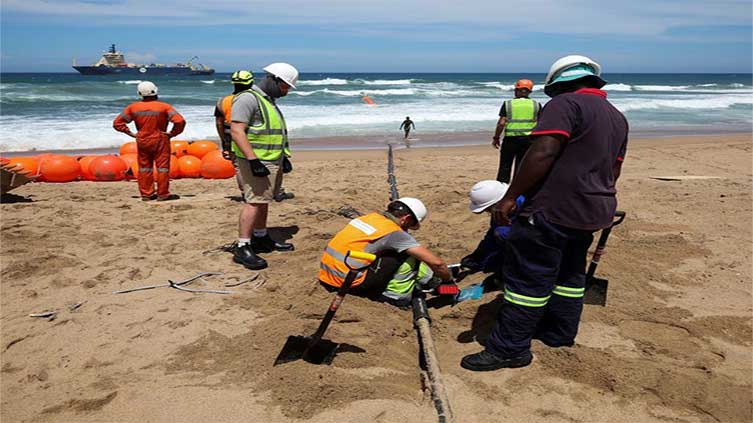China plans $500 million subsea internet cable to rival US-backed project

Technology
The wire will travel through Hong Kong, China, Singapore, Pakistan, Saudi Arabia, Egypt and France
SINGAPORE (Reuters) - Chinese state-owned telecom firms are developing a $500 million undersea fiber-optic internet cable network that would link Asia, the Middle East and Europe to rival a similar U.S.-backed project, four people involved in the deal told Reuters. The plan is a sign that an intensifying tech war between Beijing and Washington risks tearing the fabric of the internet.
China's three main carriers – China Telecommunications Corporation (China Telecom), China Mobile Limited and China United Network Communications Group Co Ltd(China Unicom) – are mapping out one of the world’s most advanced and far-reaching subsea cable networks, according to the four people, who have direct knowledge of the plan.
Known as EMA (Europe-Middle East-Asia), the proposed cable would link Hong Kong to China’s island province of Hainan, before snaking its way to Singapore, Pakistan, Saudi Arabia, Egypt and France, the four people said. They asked not to be named because they were not allowed to discuss potential trade secrets.
The cable, which would cost approximately $500 million to complete, would be manufactured and laid by China’s HMN Technologies Co Ltd, a fast-growing cable firm whose predecessor company was majority-owned by Chinese telecom giant Huawei Technologies Co Ltd, the people said.
They said HMN Tech, which is majority-owned by Shanghai-listed Hengtong Optic-Electric Co Ltd, would receive subsidies from the Chinese state to build the cable.
China Mobile, China Telecom, China Unicom, HMN Tech, and Hengtong did not respond to requests for comment.
The Chinese foreign ministry said in a statement to Reuters that it "has always encouraged Chinese enterprises to carry out foreign investment and cooperation" without commenting directly on the EMA cable project.
News of the planned cable comes in the wake of a Reuters report last month that revealed how the U.S. government, concerned about Beijing eavesdropping on internet data, has successfully thwarted a number of Chinese undersea cable projects abroad over the past four years. Washington has also blocked licenses for planned private subsea cables that would have connected the United States with the Chinese territory of Hong Kong, including projects led by Google LLC, Meta Platforms, Inc and Amazon.com Inc.
Undersea cables carry more than 95% of all international internet traffic. These high-speed conduits for decades have been owned by groups of telecom and tech companies that pool their resources to build these vast networks so that data can move seamlessly around the world.
But these cables, which are vulnerable to spying and sabotage, have become weapons of influence in an escalating competition between the United States and China. The superpowers are battling to dominate the advanced technologies that could determine economic and military supremacy in the decades ahead.
The China-led EMA project is intended to directly rival another cable currently being constructed by U.S. firm SubCom LLC, called SeaMeWe-6 (Southeast Asia-Middle East-Western Europe-6), which will also connect Singapore to France, via Pakistan, Saudi Arabia, Egypt, and half a dozen other countries along the route.
The consortium on the SeaMeWe-6 cable – which originally had included China Mobile, China Telecom, China Unicom and telecom carriers from several other nations – initially picked HMN Tech to build that cable. But a successful U.S. government pressure campaign flipped the contract to SubCom last year, Reuters reported in March.
China Telecom and China Mobile pulled out of the project after SubCom won the contract last year and, along with China Unicom, began planning the EMA cable, the four people involved said. The three state-owned Chinese telecom firms are expected to own more than half of the new network, but they are also striking deals with foreign partners, the people said.
The Chinese carriers this year signed separate memoranda of understanding with four telecoms, the people said: France’s Orange SA, Pakistan Telecommunication Company Ltd (PTCL), Telecom Egypt and Zain Saudi Arabia, a unit of the Kuwaiti firm Mobile Telecommunications Company K.S.C.P.
The Chinese companies have also held talks with Singapore Telecommunications Limited, a state-controlled firm commonly known as Singtel, while other countries in Asia, Africa and the Middle East are being approached to join the consortium as well, the people involved said.
Orange declined to comment. Singtel, PTCL, Telecom Egypt and Zain did not respond to requests for comment.
American cable firm SubCom declined to comment on the rival cable. The Department of Justice, which oversees an interagency task force to safeguard U.S. telecommunication networks from espionage and cyberattacks, declined to comment about the EMA cable.
The battle over internet hardware mirrors the conflict taking place over social media apps and search engines created by U.S. and Chinese firms.
The United States and its allies have banned the use of Chinese-owned short video app TikTok from government-owned devices due to national security concerns. Numerous countries have raised fears about the Chinese government gaining access to the data that TikTok collects on its users around the world.
China, meanwhile, already restricts what websites its citizens can see and blocks the apps and networks of many Western technology giants, including Google, YouTube, Facebook and Twitter.

